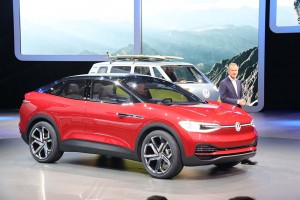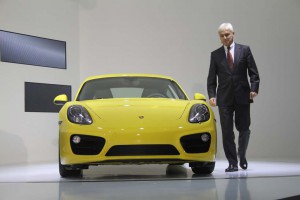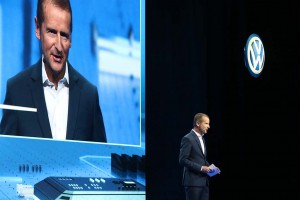Volkswagen Group CEO Matthias Mueller is expected to be forced out at a management meeting Friday, with VW brand boss Herbert Diess expected to replace him, according to reports out of Germany.
The shake-up, which has apparently been in the works for months, has the blessing of some of VW’s top shareholders, as well as its chairman and powerful labor chief. It will mark the most extensive management moves since shortly after the automaker’s diesel emissions scandal broke in September 2015.
VW issued a short statement noting it is considering “a further development of the management structure of the group which would also be associated with personnel changes in the board of management.” The statement hinted that changes under study “could include” the naming of a new CEO, adding that Mueller himself “showed his willingness to contribute,” suggesting the 64-year-old executive might voluntarily step aside rather than fight to retain his post. He is currently under a contract set to continue through 2020.
(Click Here to check out VW’s new Atlas Sport Cross SUV.)
Mueller, the former head of VW’s highly profitable and prestigious Porsche brand, was named CEO a month after the U.S. EPA revealed that the German automaker had cheated on diesel emissions tests. He replaced Martin Winterkorn who remains under investigation by German authorities for his possible role in the scandal.
Mueller has received praise for helping stabilize Volkswagen in the wake of the diesel revelations, and he has had to chart a tough course, VW so far agreeing to settlements, fines and buybacks estimated to eventually cost the company around $30 billion.
But he appears to have lost the confidence of some of the company’s most powerful players, including two members of VW’s controlling family, Wolfgang Porsche and Michael Piech. Among those also believed calling for his ouster are VW Chairman Hans Dieter Poetsch and Bernd Osterloh, who heads VW’s powerful labor union.
But the bigger winner will be 59-year-old Herbert Diess. The Bavarian native has only been with Volkswagen since July 2015, having been hired away from rival BMW, where he had spent eight years on that automaker’s executive board. With a doctorate in factory automation, Diess has been a change agent, in part relying on the diesel crisis to free his hand to make major adjustments to both the products Volkswagen designs and how it builds them.
He has taken a scalpel to costs, slashing payments to suppliers while also targeting VW’s traditionally high labor costs. Under his brief tenure, the Volkswagen brand has doubled its return on sales and scored significant growth in worldwide markets.
Some of the changes were already in the works, including a shift from traditional sedans, hatchbacks and wagons to higher-margin utility vehicles. That has proved especially successful in the long-troubled U.S. market where models like the new Atlas and redesigned Tiguan SUVs helped VW boost sales by 5.2% last year, even as the overall market dipped 1.8 percent.

Diess has become a major proponent of electrification. He's shown here with the I.D. Crozz concept at last year's Frankfurt Motor Show.
But Diess has pressed his team to move even faster to respond to global trends. At the recent New York International Auto Show, for example, it debuted a second version of the Atlas while also unveiling a concept pickup truck, the Atlas Tanoak.
(A VW pickup? Click Here to see what might be in store for the Atlas Tanoak concept.)
Diess has been even more aggressive in reshaping the brand’s technology focus. He ruled out returning to the U.S. with new diesels. Instead, he has taken a leading role in the parent company’s push into electrification, with 50 all-electric models due by the middle of the coming decade. That includes an entirely new sub-brand for Volkswagen which will launch, among other things, a modern interpretation of its classic Microbus, the battery-electric I.D. Buzz.
(VW upping the EV ante by placing $25 billion in battery orders. Click Her
Diess also has been a major proponent of expanding beyond VW’s traditional auto manufacturing role into a range of new “mobility services,” such as ride-sharing, as well as autonomous vehicles.
“Investors will like his strong execution track record and his understanding of mobility 2.0,” Evercore ISI analyst Arndt Ellinghorst told the Reuters news service. “Put simply, we see no better alternative to Matthias Mueller to make the company fit for the future by dealing with some of the legacy businesses as well as making the right investments in future technologies.”
Diess hasn’t been afraid of banging heads and hasn’t always made friends in the push – mandated by former CEO Winterkorn – to cut 5 billion Euros, or about $6 billion, in cothe sts over his first two years. Workers were among his targets, VW’s plants having some of the highest labor costs in Europe.
But the fact that works council boss Osterloh appears to be supporting Diess suggests how effective the likely new Group CEO has been. Of course, it could also help that, according to European news reports, the automaker is set to give workers a seat on its powerful management board as part of the upcoming management shake-up.


